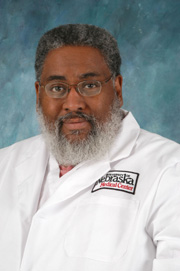 The mounting evidence of significant disparities in minority health outcomes in the United States has health professionals increasingly trying to reach minorities where they live — especially African Americans.
The mounting evidence of significant disparities in minority health outcomes in the United States has health professionals increasingly trying to reach minorities where they live — especially African Americans.
That’s why Ira Combs, R.N., community liaison nurse coordinator at UNMC; the Urban League of Nebraska; and 100 Black Men of Omaha are co-sponsoring a special health screening focusing on minority men.
“Men’s Day Health Screening” will be Saturday, Oct. 26, from 10 a.m. to 2 p.m., at the Urban League Family Resource Center, 30th and Lake Streets. The theme of the event is “Men bring your family, families bring your men.”
Health professionals will screen for prostate cancer, high blood sugar (diabetes) and high blood pressure. There will be free refreshments, door prizes for local sports events and a wide selection of information on health concerns particularly affecting the African American community.
Reaching them where they live
Both the Urban League and 100 Black Men of Omaha have joined numerous projects aimed at reaching members of the black community where they are most accessible — at home, church, neighborhood schools, and local retail businesses. But Combs also wages a virtual one-man crusade for community-based screening and early detection. He has a regular circuit of neighborhood screening opportunities from Youngblood’s Barber/Beauty Shop to Phil’s Foodway and Baker’s Supermarket. With his screening and medical gear, Combs will request a screening about any place in the black community where two or more people want to hear what he has to say.
Reports find significant health disparities
“On March 20, the National Academies Institute of Medicine released a devastating report about health disparities among the nation’s minorities,” Combs said. “Alan Nelson, a retired physician and former president of the American Medical Association, said that ‘Disparities in the health care delivered to racial and ethnic minorities are real and are associated with worse outcomes in many cases, which is unacceptable. The real challenge lies not in debating whether disparities exist, because the evidence is overwhelming, but in developing and implementing strategies to reduce and eliminate them.’ ”
“On Oct. 9, the American Heart Association, the American College of Cardiology Foundation and the Association of Black Cardiologists launched an initiative in Washington, D.C., to focus on racial and ethnic disparities in cardiac care. Heart disease continues to be the leading cause of death in America.”
A report by the Pharmaceutical Research and Manufacturing Association released Oct. 1 indicates there are 249 new medicines in the pipeline aimed at diseases that disproportionately afflict African Americans or diseases that are among the top 10 causes of death among African Americans. Even the drug companies are trying to get up to speed on marketing more effective drugs for black people.
In addition, the Nebraska Minority Health Association held a special press conference Oct. 11 to discuss how the state can better respond to evidence that minorities are getting the worst of too many diseases.
Making a difference
Combs, Edward Cochran of the Urban League CEO, and Ramon Henderson, chairman of the health and wellness committee for 100 Black Men of Omaha, believe that health professionals have to keep coming to the community, not just with screenings and information but with a much heightened sense of mission. Combs sets his own example through regular visits to North Omaha barbershops, beauty shops, schools, grocery stores and churches where he regularly screens for prostate cancer, high blood pressure and high blood sugar.
“People may think that one more health screening event won’t make that much difference, but they would be wrong,” Combs said. “Thousands of blacks in Omaha right now can’t remember the last time somebody checked them for diabetes, let alone men for prostate cancer. Regularly checking your blood pressure is a first line of defense against cardiovascular disease. A potential diabetic can be identified with a couple of drops of blood. I can draw a small amount of blood in one minute for a PSA prostate cancer screening. All the tests can be done in places while other people get a haircut, manicure or shop for groceries.
“It does make a difference when we reach people where they live and get in the flow of their lives. It builds on their trust for other health professionals. And it gives an opportunity to expand their health knowledge and understanding that the community is going to have to take the initiative in improving its own health issues. When we trust each other and work together, we can definitely make a difference.”
For more information
For more information about the Men’s Day Health Screenings or Ira Combs mini-health fair screenings, contact Combs at 559-3813.